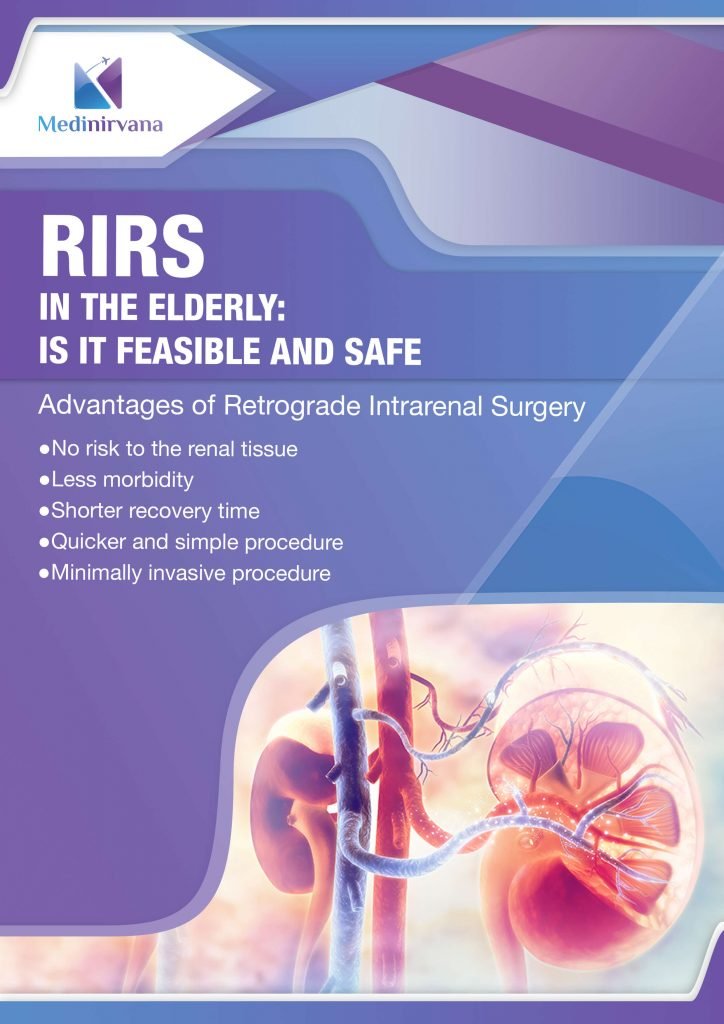In Western countries, senior adults are the fastest-growing population. It is estimated by demographic projections that the count of older people (≥60 years) is likely to rise to more than 2 billion by the end of the year 2050 compared to 915 million in 2015. Undoubtedly, age is not an illness, but it is the most critical factor for perioperative complications. According to many studies in the past, there has been an increasing prevalence of urinary stone complications worldwide. In older patients, the incidence of renal stones is likely to notice a surge as the general population ages, especially in developed countries like the United States, Canada, Germany, and the United Kingdom.
In the last decade, Retrograde intrarenal surgery (RIRS) has emerged as a successful choice for treating most kidney stones even in complicated clinical scenarios like obesity, calyceal diverticula, coagulopathy, kidney malformations, and large renal stones.
Table of Contents
Feel free to skip ahead if one topic catches your eye:
- How is RIRS a Feasible and safe process For the Elderly?
- How To Prepare Yourself for RIRS in India?
- Why Choose India for RIRS Treatment?
- What is the cost of RIRS in India?
How is RIRS a Feasible and safe process For the Elderly?
Retrograde intrarenal surgery (RIRS) has emerged as a preferred option for treating stones in elderly patients. A surgical technique with a low complication rate, RIRS, is considered an excellent choice for renal stones up to 20 mm. It has potentially lower morbidity than percutaneous nephrolithotomy (PCNL) and higher stone-free rates than extracorporeal shock wave lithotripsy (ESWL).
This endoscopic surgery is performed using Holmium (a laser fiber) and a viewing tube known as a fiber optic endoscope. Small fragments of the stones are taken off through stone baskets once the surgeon removes the large stone. In some cases, the surgeon may push a stent in the kidney to improve drainage. During this procedure, the stone is blasted or crushed through a laser probe; it may be removed manually through forceps. The urologist may provide general or spinal anesthesia during the procedure. It is worth noting that the entire process does not involve any incisions, and therefore patients experience a quick recovery time.
Advantages of Retrograde intrarenal surgery
- No risk to the renal tissue
- Less morbidity
- Shorter recovery time
- Quicker and simple procedure
- Minimally invasive procedure
The RIRS procedure is ideal for cases where:
- Stones are large
- The patient is obese or has complex anatomical kidneys
- The patient is on anticoagulants
- The patient has bleeding disorders
- The patient’s kidney has a tumour
Who is not the Good Candidate for RIRS?
- Patients with a history of urinary tract reconstruction
- Patients who are intolerant of stents
- The size of the renal stones is more than 20mm in diameter.
Some patients may develop fever after the RIRS procedure, but this can be easily managed. Typically, this procedure involves a hospital stay of more than 24 hours, but some patients may be asked to stay for a little longer because of intra/post-operative events or specific preoperative health complications. The approximate time taken for the RIRS surgery is 1.5 hours.
How To Prepare Yourself for RIRS in India?
You need to make arrangements on your behalf related to important documents such as passport and medical visas, medical reports, diagnostic results, etc. It is also advisable that you must have a word with your RIRS surgeon in India or their international patient desk to know everything from the moment you left your home country to get RIRS performed in India.
Before the Surgery: Your doctor will perform a series of tests for analyzing your general health and the position of the stones. There may also be a test for ascertaining your response to anesthesia before the RIRS is scheduled. In some cases, the doctor may perform the preoperative stenting two to three weeks before the RIRS so that the ureteroscope can quickly enter the kidneys as the ureter is already dilated. You will be asked to fast for at least 6-8 hours on the day of the surgery.
During the Surgery: You will be under the influence of anesthesia, and an endoscope will be used by the urologist to reach the bladder through the urethra. It will then be moved ahead to the area of urine storage in the kidney. The endoscope will locate stones during the process that will then be blasted or crushed with a laster. In the majority of cases, patients can expect a discharge from the hospital the next day post-surgery.
After the Surgery: A urine catheter may be placed for a day or longer in the urethra after completing the RIRS to minimize problems and pain while urinating. You will then be placed in a recovery room and asked to take a rest for 24 hours. The medical support staff will request you to consume many fluids, mostly water to keep infections away and reduce the amounts of sodium, protein, calcium, and oxalate.
One of the best things about RIRS in India is that you will get qualified assistance at every step of the treatment process. This would ensure that you always make an informed decision in your quest to lead a healthy and everyday life again.

Why Choose India for RIRS Treatment?
Indian hospitals were well-equipped to handle complex surgical procedures such as RIRS. The standards of healthcare and hygiene are world-class, and India is home to a skilled pool of manpower when it comes to top doctors, nurses, surgeons, and support staff—rated very highly across the globe. Indian hospitals that specialize in RIRS treatment charge only a nominal fee that is about one-fifth or one-tenth of the costs that are payable in developed countries of the world. The best thing is that you can access world-class facilities along with the latest techniques. Since most Indian doctors, nurses and other medical staff are well-versed in global languages such as English, there would never be any language barrier.
The list of advantages associated with RIRS in India does not end here. Indian hospitals have the best success rates when it comes to Retrograde intrarenal surgeries. Furthermore, most of these medical facilities are accredited by world-renowned regulatory associations like the National Accreditation Board for Hospitals and Healthcare Providers (NABH) and Joint Commission International (JCI). If that was not all, you could receive almost-instant medical visas with just a few clicks.
The Indian government introduced the concept of an e-tourism visa regime to include medical visas. According to a report released by the Federation of Indian Chambers of Commerce and Industry (FICCI) and Ernst & Young, the market for medical tourism in India is likely to reach $9 billion by 2020. One of the most significant contributing factors behind this growth is the healthcare costs in India compared to developed countries like the UK and the US, which are at an all-time high. The report also revealed that the country hosts approximately 5 lakh medical value travelers from the Middle-East, Africa, SAARC countries, South-East Asian countries, and North America and Europe.
The country is home to 619 hospitals accredited by the National Accreditation Board for Hospitals and Healthcare Providers (NABH) and 38 hospitals accredited by the Joint Commission International (JCI).
It is because of these and many more advantages that thousands of patients from countries like the United States, Germany, Canada, France, Malaysia, and the United Kingdom, to name a few, every year visit Indian hospitals, especially those based in cities such as Delhi, Mumbai, Bengaluru, Hyderabad, Chennai, Noida, Jaipur, Ahmedabad, and Thiruvananthapuram. Moreover, Indian hospitals invest heavily in hygiene, infrastructure, supportive technology, safety, and operative techniques so patients can always expect faster recovery and better outcomes.
What is the cost of RIRS in India?
The approximate cost of RIRS in India is Rs.2-3 lakhs though it may differ from one hospital to another. Some of the aspects that define the cost of RIRS in India may include the type of medical procedure, expertise, and success rate of the hospital, room and hospital charges, etc.
Takeaway
Unarguably, India is one of the world’s most trusted and leading medical tourism destinations for countless reasons. The best part is that you can expect complete assistance from top hospitals and medical facilities across the world, whether it is about scheduling appointments with the best doctors in the healthcare industry or arranging medical visas or booking accommodation for your attendant, or seeking pre- and post-operative care.
Retrograde intrarenal surgery is a complicated medical procedure and should only be handled by an expert. One thing is for sure, you can never go wrong by choosing India – a country that has given our world some of the finest surgeons and nurses – and you can explore all these and many more advantages without burning your pocket.






Leave a Reply